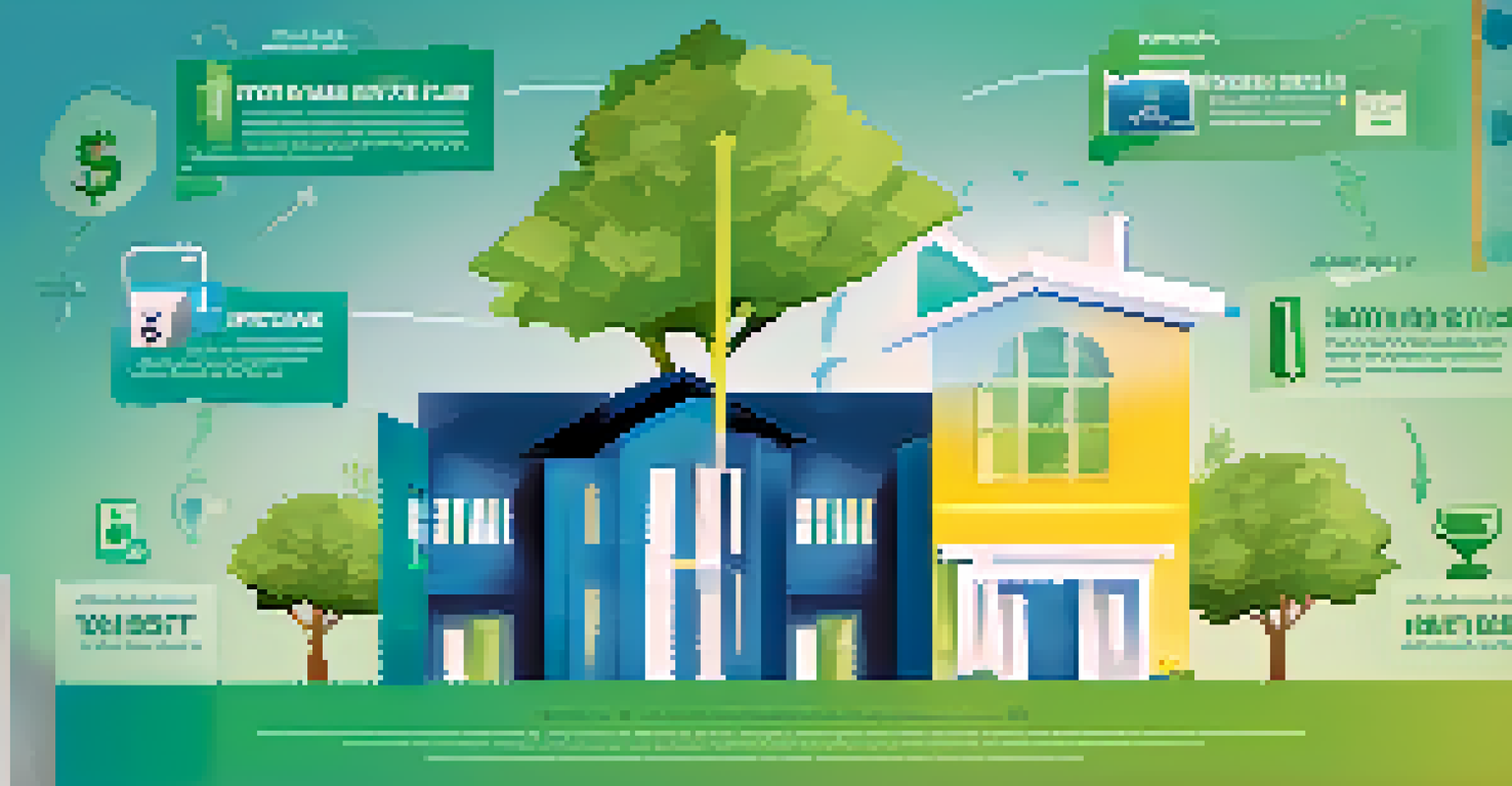How Refinancing Your Mortgage Can Save You Money

Understanding Mortgage Refinancing Basics
Mortgage refinancing involves replacing your existing home loan with a new one, often with better terms. This can lead to lower interest rates or adjusted loan durations that fit your financial situation. By comprehending the basic mechanics of refinancing, homeowners can make informed decisions about their mortgage.
Refinancing is not just about getting a lower interest rate; it’s about aligning your mortgage with your current financial goals.
When you refinance, you might opt for a different loan type, such as switching from an adjustable-rate mortgage (ARM) to a fixed-rate mortgage. This can provide stability in your monthly payments, making budgeting easier. Understanding these options is crucial for maximizing your savings.
It's essential to evaluate your current mortgage terms compared to potential refinancing offers. Even small changes in interest rates can significantly impact your overall financial health. So, knowledge is power when it comes to refinancing!
Lowering Your Interest Rate for Savings
One of the primary reasons homeowners refinance is to secure a lower interest rate. A lower rate means smaller monthly payments, which can free up cash for other expenses or savings. Over the life of the loan, this can lead to substantial savings.

For example, if you refinance a $200,000 mortgage from a 4% to a 3% interest rate, you could save thousands in interest payments. It’s like switching from a gas-guzzler to a fuel-efficient car; the savings add up over time. This is one of the most straightforward ways refinancing can benefit you.
Refinancing Lowers Your Payments
Refinancing your mortgage can secure a lower interest rate, resulting in smaller monthly payments and substantial savings over the loan's lifetime.
However, it's important to factor in closing costs and fees associated with refinancing. While a lower interest rate can provide savings, ensure that the overall costs don't outweigh these benefits. Careful calculations will help you make the best financial decision.
Shortening Your Loan Term Explained
Refinancing can also involve shortening your loan term, such as moving from a 30-year mortgage to a 15-year mortgage. While the monthly payments may be higher, the total interest paid over the life of the loan can be dramatically less. This is akin to sprinting rather than jogging; you get to your goal faster, but it requires more effort.
A mortgage is a tool—how you use it will determine whether it helps or hinders your financial future.
Shortening your loan term might be ideal if you can afford the increased payments. It can help you build equity faster and potentially pay off your home sooner. Plus, as interest rates drop, it may be easier to manage the higher payments.
However, consider your long-term financial goals and whether this aligns with them. If you plan to stay in your home for a long time, a shorter term can be a wise investment in your future savings.
Tapping Into Home Equity for Cash Flow
Another benefit of refinancing is the ability to tap into your home equity. This can provide cash for home improvements, debt consolidation, or other financial needs. Think of it as accessing a hidden treasure in your home that can be used to improve your financial situation.
Home equity refinancing can be especially useful if you've built up significant equity over the years. This can help you fund major expenses like education or medical bills without resorting to high-interest loans. It's a practical way to leverage what you already own.
Accessing Home Equity Wisely
Refinancing allows homeowners to tap into their equity for cash flow needs, but it’s crucial to assess the risks involved.
However, using equity comes with risks. It’s essential to ensure that taking out additional funds won’t jeopardize your financial stability. Assess your situation carefully and consult with a financial advisor if needed.
Consolidating Debt Through Refinancing
Refinancing can also be a strategic move to consolidate high-interest debts. By rolling those debts into your mortgage, you can lower your overall interest rate and simplify your payments into one monthly bill. It’s like cleaning out your closet—once it's organized, it becomes much easier to manage.
This approach can lead to significant savings, especially if you’re currently juggling multiple high-interest debts. For instance, if you have credit card debt at 20% interest, consolidating it through refinancing can save you money in the long run. However, be cautious not to rack up more debt after paying off your existing obligations.
Always weigh the benefits against potential risks. While consolidating debt can ease financial burdens, it doesn’t eliminate them. It’s crucial to create a sound plan that keeps you on track.
The Importance of Credit Score in Refinancing
Your credit score plays a crucial role in determining the interest rates you qualify for when refinancing. A higher score can unlock lower rates, making refinancing more beneficial. Think of your credit score as your financial report card; the better it is, the more perks you can enjoy.
Improving your credit score before refinancing can lead to significant savings. Simple actions, like paying down existing debts or making timely payments, can enhance your score over time. This preparation can make a world of difference when you approach lenders.
Credit Score Affects Rates
A higher credit score can unlock better refinancing rates, making it essential to improve your score before refinancing.
Conversely, a lower score may limit your options or result in higher rates. Understanding your credit situation and taking proactive steps can ensure you secure the best refinancing deal available.
Timing Your Refinance for Maximum Benefits
Timing is key when it comes to refinancing your mortgage. Market conditions, such as interest rate fluctuations, can greatly affect your potential savings. It’s like catching a wave; you want to be on it at just the right moment for the best ride.
Monitoring interest rates and economic indicators can help you gauge when to refinance. If rates drop significantly, it might be a perfect time to take the leap. However, don’t rush into a decision without thorough research and consideration of your financial situation.

Consulting with a mortgage professional can provide valuable insights and help you navigate the timing of your refinance. Their expertise can guide you toward making a decision that maximizes your financial benefits.